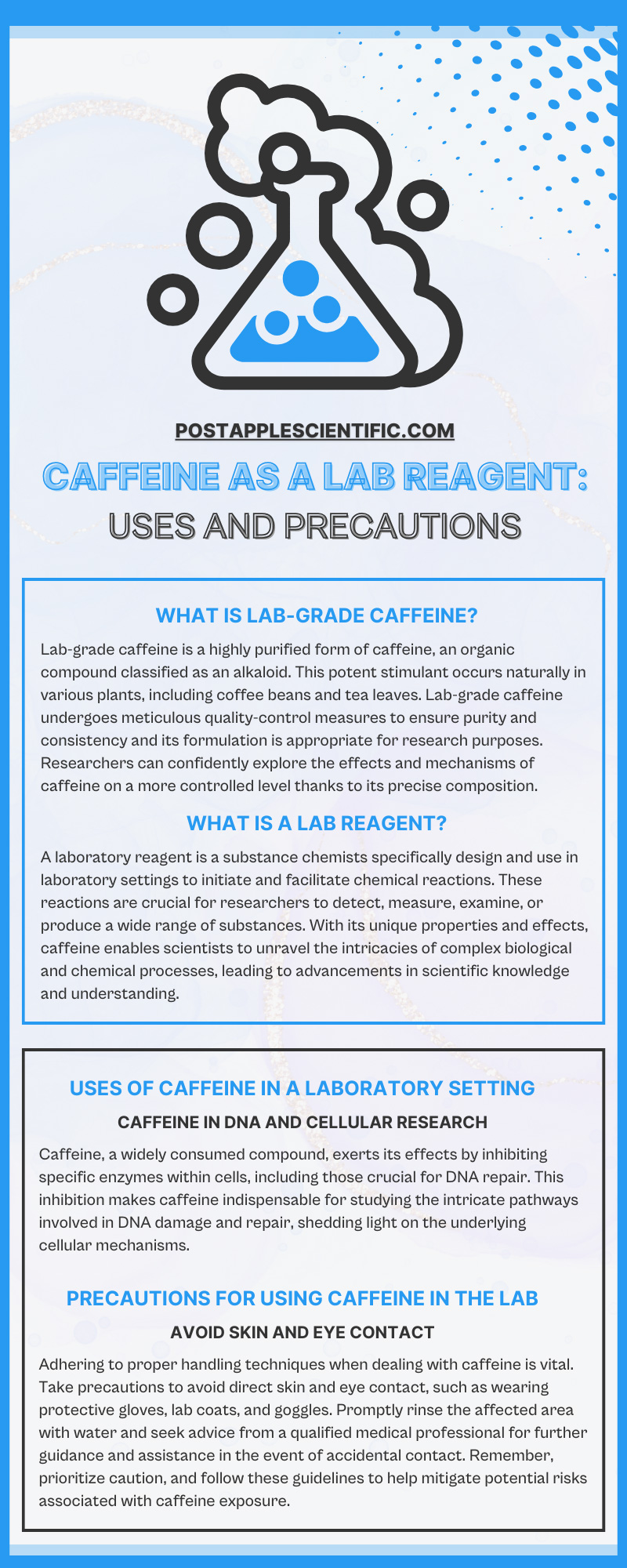The average consumer might think of coffee, tea, and energy drinks when they think of the word “caffeine.” However, specific types of caffeine have important applications in scientific research and laboratory studies. Scientists use lab-grade caffeine as a lab reagent as it plays a significant role in several research areas. Keep reading to explore caffeine as a lab reagent, its uses, and precautions, and why it’s essential to scientific advancements.
What Is Lab-Grade Caffeine?
Lab-grade caffeine is a highly purified form of caffeine, an organic compound classified as an alkaloid. This potent stimulant occurs naturally in various plants, including coffee beans and tea leaves. Lab-grade caffeine undergoes meticulous quality-control measures to ensure purity and consistency and its formulation is appropriate for research purposes. Researchers can confidently explore the effects and mechanisms of caffeine on a more controlled level thanks to its precise composition.
What Is a Lab Reagent?
A laboratory reagent is a substance chemists specifically design and use in laboratory settings to initiate and facilitate chemical reactions. These reactions are crucial for researchers to detect, measure, examine, or produce a wide range of substances. With its unique properties and effects, caffeine enables scientists to unravel the intricacies of complex biological and chemical processes, leading to advancements in scientific knowledge and understanding.
Uses of Caffeine in a Laboratory Setting
Caffeine is a versatile lab reagent with numerous applications across various scientific disciplines. Scientists use it widely in DNA and cellular research, where its stimulating properties help them investigate various molecular processes. Additionally, caffeine aids in pharmacological studies, where it serves as a valuable tool scientists can use to explore the effects of certain compounds on cellular activity. With its multifaceted nature, caffeine continues to contribute to advancements and discoveries in diverse areas of scientific inquiry. Learn more about each application below.
Caffeine in DNA and Cellular Research
Caffeine, a widely consumed compound, exerts its effects by inhibiting specific enzymes within cells, including those crucial for DNA repair. This inhibition makes caffeine indispensable for studying the intricate pathways involved in DNA damage and repair, shedding light on the underlying cellular mechanisms. Furthermore, this reagent’s impact on various cellular processes also aids in cancer research and exploration of the interactions between caffeine and various bodily processes.
Caffeine in Pharmacological Studies
The pharmacy industry also uses caffeine widely as a key investigative component when researchers study the effects of a specific medication on various body systems. Because caffeine is a common ingredient in many consumer products, many researchers desire to understand its effects. Notably, researchers delve into the intricate impact of caffeine on the cardiovascular system, the central nervous system, and metabolic processes. By comprehending these effects in greater detail, scientists can harness the properties of caffeine to develop and optimize pharmaceuticals and enhance medicine delivery systems for improved therapeutic outcomes.
Precautions for Using Caffeine in the Lab
Although caffeine is generally safe to use, it is important to take several precautions when working with caffeine as a lab reagent to ensure the safety of lab personnel. These safety precautions must include wearing appropriate personal protective equipment, following proper handling procedures, and implementing safety measures to prevent accidents or exposure. By being diligent with these precautions, scientists can create a safer working environment and mitigate potential risks associated with caffeine in the laboratory setting.
Avoid Skin and Eye Contact
Adhering to proper handling techniques when dealing with caffeine is vital. Take precautions to avoid direct skin and eye contact, such as wearing protective gloves, lab coats, and goggles. Promptly rinse the affected area with water and seek advice from a qualified medical professional for further guidance and assistance in the event of accidental contact. Remember, prioritize caution, and follow these guidelines to help mitigate potential risks associated with caffeine exposure.
Prevent Ingestion
Lab-grade caffeine has a higher concentration than its consumer-grade counterpart, with the potential for harmful or even fatal effects if anyone were to ingest it. Establish strict handling protocols to ensure the safety of lab personnel. Implement designated areas for eating and drinking, which should remain separate from lab spaces. Additionally, label all lab-grade caffeine-containing substances clearly and prominently to minimize the risk of unintended consumption. Make sure your staff understands the common symptoms of accidental anhydrous caffeine ingestion, such as elevated heart rate, nausea, anxiety, dizziness, and more. By adopting these measures, we can prioritize the well-being and safety of everyone in the laboratory environment.
Proper Caffeine Storage and Ventilation
Having a designated area specifically for storing reagent caffeine is crucial. Keep this area separate from incompatible reagents and heat sources to prevent potential reactions or degradation. Additionally, maintaining a dry and well-ventilated storage environment is also critical, as lab-grade caffeine is hygroscopic and can degrade under humid conditions. By paying attention to these details, you can ensure the longevity and quality of your caffeine supply.
Where To Obtain Lab-Grade Caffeine
You can find a range of products at Post Apple Scientific if you oversee a pharmaceutical laboratory or other research-related lab looking for reagents for your studies. We offer bulk caffeine anhydrous powder for studies and experiments if you need this particular material. You can also find a range of other reagents, chemical solutions, cleaning solutions, and more for professional and educational lab use. Feel free to browse our collection of reagents and other lab equipment to find all the supplies your laboratory needs in one place.
It is of the utmost importance for laboratory personnel to understand the various aspects of caffeine as a lab reagent, including its uses, precautions, and potential risks. By having a comprehensive understanding, they can effectively safeguard themselves and maintain the integrity of their research endeavors. Handling lab-grade caffeine with meticulous care is important, as doing so promotes scientific advancements and ensures the safety of those dedicated to exploring the wonders of this exciting field. By exercising caution and adhering to proper usage protocols, researchers can unlock new possibilities and uncover valuable insights while minimizing potential hazards. Learn more today at Post Apple Scientific if you have any questions about obtaining and using lab-grade caffeine. Don’t forget to browse our full listings for lab-grade caffeine and other helpful laboratory regents today.


